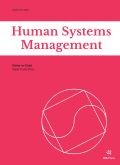Authors: Harun, Harmani | Rahman Lubis, A. | Darsono, Nurdasila | Djalil, Muslim A. | Chan, Syafruddin
Article Type:
Research Article
Abstract:
BACKGROUND: In the last few decades, the rural bank has a focus of both researchers and policy-makers as it plays a crucial role in promoting the welfare of lower-income groups in most of the underdeveloped and developing countries, including Indonesia. However, as the newly established micro-financing institutions, as compared to the well-established large-scale commercial banks in the country, these micro-financing institutions have been perceived to have a lower level of competitiveness and performance. OBJECTIVE: Thus, this study explores and analyzes factors of core competency, innovation, and reputation in determining the competitiveness and performance of the rural banks (Bank
…Perkreditan Rakyat - BPRs ) in Aceh, Indonesia. It also attempts to empirically investigate and analyze the mediated effect of competitive advantage on the influences of core competency, innovation, and reputation on performance of the BPRs in the country. METHODS: 350 employees at the 16 BPRs in 7 districts in Aceh province, Indonesia were selected as respondents of the study using the stratified random sampling technique. The study used the structural equation modeling analysis to examine the interrelationships among the variables, to answer the objectives of the study. RESULTS: The study found a positive influence of the core competency, innovation, and reputation on the BPRs’ competitive advantage. Except for the BPRs’ reputation, all variables positively affected the BPRs’ performance. Finally, the study found a significant partial mediated effect of competitive advantage on the relationship between core competency and innovation to the BPRs’ performance and a significant full mediated effect of competitive advantage on the relationship between reputation and the BPRs’ performance. CONCLUSIONS: These findings imply that all efforts to enhance the BPRs’ performance should be focused on the improvement of competitive advantage based on enhancing the competency, innovation, and reputation of the BPRs.
Show more
Keywords: Core competency, innovation, reputation, competitive advantage, rural
bank
DOI: 10.3233/HSM-190595
Citation: Human Systems Management,
vol. 39, no. 2, pp. 155-168, 2020
Price: EUR 27.50





